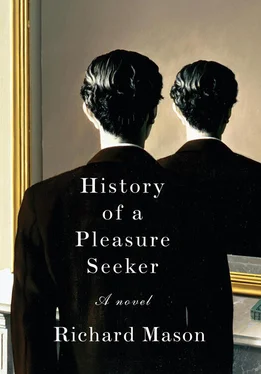The day was turning into a scorcher. Piet had completed the figurines and was beginning the jewel box when exhaustion finally brought an end to his pupil’s exertions. Egbert considered running from the room but lacked the energy even for that. Instead he slumped forward over the piano, wishing for oblivion.
Piet went to him. Egbert was prepared for anger and further punishment. To be met with kindness undid him and when Piet embraced him he burst into wrenching sobs. He cried and cried as his tutor carried him tenderly to the sofa, and when he was finished Piet asked in his gentlest voice the question he had been pondering all morning.
“Dear Egbert,” he said. “Is music the solution or the problem?”
Six hours later, Hilde Wilken knocked on Egbert’s door. When there was no answer, she opened it and went in and put the tray she was carrying on the writing desk. Egbert was fast asleep, his cheeks aflame. She looked at him nervously.
Hilde had a brother of her own, a year younger than Egbert, and at first she had looked forward to working in a house lived in by a ten-year-old boy. But Egbert Vermeulen-Sickerts frightened her. The music he made was so incomprehensible. He was so small and slender, and yet his hands were quite as large as a fifteen-year-old’s, with long thin fingers that made her think of amphibians. He did not seem quite human. She gathered her courage and touched his arm. It was as cold as a corpse’s. “M-Master Egbert,” she whispered. He did not stir. She sat down in the comfortable armchair at the foot of his bed. She had spent all afternoon tidying his sisters’ closets and worrying that no man would ever love her, and welcomed a moment to rest. She leaned back into the cushions, wondering if perhaps he had died. Death was no respecter of classes. It would serve this family right, she thought, thinking of the sharpness with which Louisa had just criticized her folding of a cashmere cloak. As if one was born knowing that cloaks must be hung, not folded! A cold violence settled on her, in which pain at the way Didier now smiled only at Piet Barol mingled with a hatred of her employer’s daughters and effervesced into one bitter tear.
“Master Egbert!” she said, leaning forward and shaking his arm more vigorously, thinking how unjust it was that she, a fully grown woman, should call a ten-year-old imbecile “master.”
Egbert opened his eyes.
Hilde stood hurriedly and curtsied. “I have brought your supper.”
Egbert blinked, and the mortifying events of the afternoon returned with full force. “Thank you, Hilde.” He copied his mother’s cold formality. “Is everyone in to dinner?”
“Your sisters are out, I believe.”
This meant that Piet Barol would be eating alone with his parents and might tell them what had happened. The look on Egbert’s face prompted sympathy in Hilde, who was not as stony hearted as the Vermeulen-Sickertses often made her feel. “I’ll bring you some jelly later,” she said, and left him.
The next morning, Egbert found the courage to ask if his parents had been told about his crying. They had not, because Piet knew that nothing would be accomplished without the boy’s trust and had not betrayed it. They spent a pleasant morning discussing the causes of the French Revolution, but there was no repeat of the previous day’s intimacy. The Shadowers demanded privacy and Egbert was too ashamed of his subjection to them to violate it. So when Piet asked again whether music was the solution or the problem, he turned on him the stubborn blankness that had defeated his other tutors and merely said he did not know.
Piet was wise enough not to show his exasperation, but as the hot summer weeks melted into one another it began to rise. Saving Egbert was the reparation his self-respect demanded, and each encounter with Jacobina heightened the urgency of making amends to her husband. He told the boy about his own mother’s death, hoping that a confidence from him might inspire one in return. It did not. He complained of his father to show that he, too, had his troubles. But Egbert showed no curiosity about his private affairs. Piet Barol was not accustomed to encountering such implacable resistance, and it annoyed him. In their bathroom late at night, Didier Loubat mocked his efforts and told him that nothing, save the loss of his father’s fortune, would ever save such a helpless brat. “No one’s fixed him before, so they won’t fire you” was his analysis. “Stay as long as you can put up with it, save the money for a new life, then let him drive someone else to lunacy.”
But Piet did not intend to be vanquished; and one Saturday afternoon, coming across a handsomely bound edition of the Chopin ballades at a shop on the Kalverstraat, he bought it and went home whistling. He was up early the next morning and entered the house next door only a moment after Egbert had completed his crossing of the entrance hall floor. The boy was playing a martinet fugue and its claustrophobic precision convinced him he had found a tonic. Manic bouts of Bach were clearly doing Egbert no good; perhaps Romantic music would inspire some expression of inner feeling.
“I have a present for you,” he said warmly, after the fugue’s seventh rendition.
Egbert accepted the volume with a mumbled word of thanks; but when Piet suggested he play something from it the boy shook his head, left the piano, and opened his French dictionary.
Piet controlled his irritation with difficulty. He did not know that Egbert’s masters insisted on white and black notes being played with equal weight, for precisely quantified periods, and that Chopin’s time permissiveness, his infinite gradations of shade and meaning, were impossible; dangerous even to imagine.
He went to the piano himself and played haltingly through the first page of a ballade, hoping that his errors would tempt the boy to show him he could do better. They did not. Egbert remained at the table, apparently immersed in his dictionary; in fact in thrall to powerful and conflicting impulses he could not resolve. He had no friends, and no one outside his immediate family had ever bought him a gift. He yearned to show gratitude and seize the opportunity Piet offered, but fear of reprisals restrained him.
“Come and play this. It’s too difficult for me,” said Piet at last.
“No thanks,” murmured Egbert, with maddening insouciance.
The following Sunday, the 11th of August, was Piet’s day off. He did not even consider going to Leiden to visit his father but slept late and went downstairs to find Jacobina in her apple-green dress. She explained that she had missed church on account of a headache and asked whether he might perform a small service for her before the household returned. An hour later, they came back together from the house next door and parted with careful formality. Jacobina went upstairs to bathe, but Piet rarely had the house so completely to himself and did not wish to waste the opportunity. There were still three rooms, besides the maids’ quarters, that he had not seen; and unsatisfied sensual desire made him foolhardy.
He checked the kitchen to make sure the other servants had gone to church. They had. It was only 10:30. No one would be back for at least another three-quarters of an hour. He stood beside the icebox, weighing the risks, then climbed the stairs to the second floor and opened Constance’s bedroom door.
Hilde Wilken’s devotions had prevented her from ordering the chaos Constance wreaked daily upon her possessions. The girls had been at a dance the evening before, and Constance’s dress of pink gauze stitched with silver was lying on the floor where she had stepped out of it. The dressing table was cluttered with combs and brushes and pots of rouge (Constance overruled her sister’s objections to maquillage) and the air was laden with the scent of lily of the valley. Two other dresses, discarded in favor of the pink, were thrown carelessly over a chair. Piet touched one, wondering what it cost, and opened a closet to find rows and rows of shoes, many more than he had ever seen her wear.
Читать дальше












